“What will you remember? What would you like to forget?” We asked Kentuckiana physicians and administrators to share their thoughts regarding COVID-19 and March and April of this year.
Following is a collection of their comments.
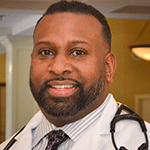 Dav Doodnauth, MD, Medical Director, Physician Owner, CareFirst Medical
Dav Doodnauth, MD, Medical Director, Physician Owner, CareFirst Medical
CareFirst Medical has been fortunate to not have any COVID-19 cases at any of the facilities we service. Central Kentucky has been blessed in that regard as nursing home infections and fatalities have grabbed the headlines across the country. One of our facilities had a healthcare worker that tested positive weeks after having symptoms, so we promptly tested all potentially affected staff, and implemented a protocol to isolate and frequently monitor residents. All came out unscathed.
Our team has been busy during this time managing the routine clinical care of residents and rehab patients. A lot of the credit must go to the staff on the front lines, especially the nurses. With their help, we have been aggressive in identifying clinical deterioration early in order to stave off any potential hospital visit that could overtax the healthcare system. The nursing home community has definitely benefited from the added attention to infection control and prevention. This will serve the homes well for years to come.
One of the great travesties of the pandemic is the loneliness and boredom of the nursing home residents. While the cards, Zoom visits and organized parades have meant well to break up the monotony, nothing can replace a loved-one’s hug or kiss. We have noted increased anxiety, depression, and weight loss. I personally have seen a spike in non-COVID related deaths.
Lastly, while seen as a godsend to other businesses and clinical practices, the adoption of virtual visits with older adults in nursing homes has been a challenge given some patients’ compromised vision, hearing and cognition. I also see the confusion in their eyes when I approach with a mask that hides my identity and muffles my voice. Best practices for this patient population will need to be explored further.
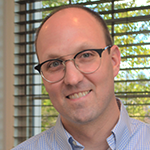
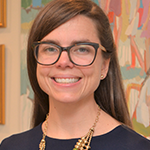 Drs. Ryan and Cady Brown, Downtown Drs. Brown
Drs. Ryan and Cady Brown, Downtown Drs. Brown
Our son’s Christmas present, a Grow-A-Frog tadpole, finally arrived in the middle of March. We knew it would not be shipped until the weather was warm enough for the amphibian to survive the trip. So throughout the winter, when our children would ask yet again where the tadpole was, we used those “teachable moments” to discuss patience. With COVID-19’s arrival and disruption of our daily lives around the same time, we soon found ourselves, and our patients, working on patience too.
At our office, we began balancing our own fears of the unknown with how we would care for our patients. We adapted our protocols once, and then many more times over the ensuing weeks. Meanwhile, at our house, we marveled at our tadpole’s adaptation to his new environment and his daily growth. We would discuss with the kids the importance of nourishment for the tadpole and keeping his bowl healthy.
During the past couple months, we have found patience and adaptation have been key to managing the stress of this moment. We have been working with our patients on maintaining their households and nourishing their bodies and minds in an effort to hopefully grow into their new environment, just as our tadpole has.
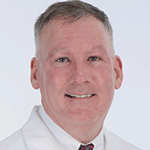 JOSEPH M. FLYNN, DO, MPH, FACP
JOSEPH M. FLYNN, DO, MPH, FACP
Chief Administrative Officer, Norton Medical Group
It is not exaggeration to say that the last several weeks have been a series of incredible highs and one of disruptive change when it comes to healthcare. My colleagues at Norton Healthcare spent many long days without pausing to ensure we delivered the safest care to patients in an environment that was safe for staff as well. One example was our team stepping up to ensure all patients were called the evening prior to their visits to screen for COVID-type symptoms to help deliver care and answer questions. Many of our earliest patients who tested positive for the SARS-CoV-2 virus came from this group. In essence, this singular change likely prevented many people from becoming infected. We rapidly expanded our video visit capabilities early on in the pandemic and this will remain a key tool for the care of patients going forward. I know I will never be able to forget the minute-to-minute evolution of information and the impact it had on operations. Overall, this devastating event has given me an insight into Norton Healthcare and my colleagues here, and I am grateful for the incredible work that was done.
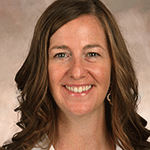 BECKY CAROTHERS, MD
BECKY CAROTHERS, MD
Pediatrician, Norton Children’s Medical Associates – Broadway
Until this time, I had yet to experience such a rapid change in medicine. As a pediatrician for 20 years, I encountered broad adjustments in medical training and the creation of electronic medical records. These changes were gradual and foreseeable.
COVID-19 did not grant us this warning. Healthcare had to act quickly to protect the patients and staff while continuing to provide reputable patient care. My white coat was replaced with scrubs. Telehealth became a part of my daily schedule. I provided a lot of medical advice over the phone. Teamwork was the focus to preserve a safe work environment. Workflows and policies sometimes changed daily, and medicine had never moved this swiftly. Looking back, it’s quite impressive in the amount that was accomplished. Some aspects have changed forever, and the transformation has been remarkable to experience.
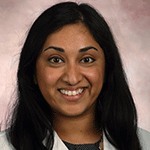 MONALISA TAILOR, MD
MONALISA TAILOR, MD
Internal Medicine Specialist with Norton Community Medical Associates – Barrett
March 2020. April 2020. Two months I will never forget. Two months filled with a rollercoaster of emotions. Two months filled with uncertainty about the virus, uncertainty about what would happen in our practice settings. Two months which will be defined by constant changes to how we practice medicine. They were two months that were absolutely surreal. The one major constant was the realization that we were all going through this together. Around the world, physicians, patients, and citizens were making these same changes to keep each other safe. This realization of not being alone in the midst of this made the last two months more comforting.
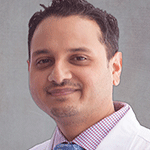 RAJDEEP GAITONDE, DO
RAJDEEP GAITONDE, DO
UofL Physicians – Cardiovascular Medicine Associates
What I will remember is that the impossible became possible and all of our greatest fears became reality, but through all the fear and panic we were able to remain steadfast and strong and united. Courage, compassion and dedication came from all over and made us as a society stronger … stronger than I thought possible. We were able to heal and save lives despite the overwhelming odds against us.
What I would like to forget is how for a moment we were scared, scared enough to possibly diminish our inner fires. Luckily, for all of us, this was a brief moment and quickly forgotten.
 JOERN B. SOLTAU, MD
JOERN B. SOLTAU, MD
UofL Physicians – Eye Specialists Chair
Everything is quite blurry.
I don’t even remember when it all started.
I think it started for me at the beginning of February, when my wife got a really bad “cold” when we were traveling to California and Utah. She had never been sick like that before. She had a dry cough and bilateral pink eye and lost her sense of smell and hearing. Luckily, we made it home, and she slowly got over it. Testing ruled out influenza and strep throat at the time. We wonder if she had COVID-19.
Soon afterwards, things went crazy. It was hard to keep up with all the changes. Long days and weekends. Constant emails with new instructions and things to consider. How do we keep the staff safe? How do we keep the patients safe? What about the patients that could lose their sight if we do not see them?
It felt like, “How can we very, very quickly hide in a hole?”
Now it is the opposite. Not quite as fast-paced, but still very intense.
How can we open to a new world, a new normal? How can we make sure everybody stays safe?
Wash your hands!
Quoting Governor Andy: “We will get through this. We will get through this together.”
Go Cards!
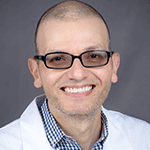 CAMILLO CASTILLO, MD
CAMILLO CASTILLO, MD
UofL Physicians – Physical Medicine & Rehabilitation
What I would like to forget about March 2020 was my hesitancy to go back home to my family after completing my clinic day, worried I would expose them to something. What I want to remember always is the camaraderie, empathy, and the outstanding work of my colleagues to step up during the peak of the crisis!
 PREJESH PHILIPS, MD
PREJESH PHILIPS, MD
UofL Physicians – Surgical Oncology
Remember:
The courage and resilience of frontline healthcare and emergency response workers
Forget:
The heart wrenching news and images from the hardest hit areas
Remember:
The community coming together to flatten the curve
Forget:
The pain that it caused people with lost jobs
Remember:
More family time
Forget:
Cancelled vacations, sports and social events
Remember:
The kindness of strangers and good Samaritans in times of crises
Forget:
Hoarders and price gougers
Remember:
Some really funny memes
Forget:
“My Sharona” song
In the end, I am proud of how we have handled the worst public health crisis of our lifetimes.
 ANDREW DUFFEE, MD
ANDREW DUFFEE, MD
UofL Physicians – Orthopedic Group
I’ll remember the appreciation shown to all of healthcare. I’ll remember the leadership that was exhibited. I’ll remember the emergence of telehealth and how my staff was amazing at implementing it at lightning speed. I’ll remember in the beginning thinking it wasn’t a big deal, and then realizing how wrong I was. I’ll remember the economic hardship that came with it. I’ll remember mass from my couch. I’ll remember the videos and memes and the toilet paper jokes. I’ll remember reconnecting with medical school colleagues.
I’d like to forget just about all of it at this point (quarantine-fatigue). I’d like to forget the images from Italy and wish they had never happened. I’d like to forget the shaming about masks and distancing and whether you did or didn’t. I’d like to forget kids missing out on graduation, postponed first Holy Communion, and a cancelled Kentucky Derby with a perfect forecast. In all – it’s all unforgettable and unimaginable – but it happened … and we got through it together.
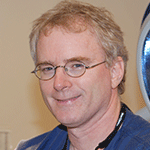 CAMERON S. SCHAEFFER, MD
CAMERON S. SCHAEFFER, MD
Pediatric Urologist and Plastic Surgeon
While rounding with the internal medicine team as a medical student, an orthopedist stopped us and asked about a mutual patient’s theophylline requirements. As he walked away, there were a few snickers, but the incident struck me. I get a lot of calls about fevers, and I always recommend a primary care evaluation. Specialists, including national public health officials, should always consider the entire health of the patient.
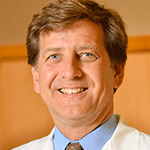 DAN GOULSON, MD
DAN GOULSON, MD
Chief Medical Officer, CHI Saint Joseph Health
The hardest part of all of this was helping the organization respond to the hundreds of scenarios that had barely been dreamed of before. Thankfully, guiding principles still held and were what you could build upon to make the decisions needed that day. But they still involved tradeoffs. It went like so, ‘We would do this if we had unlimited short-turnaround testing, but since we don’t, we’ll have to do that.’ It was manageable but challenging. I’m so thankful we didn’t have to make any of the ultimate tradeoff decisions — who gets a ventilator and who doesn’t.
 KEVIN MOORE, MD
KEVIN MOORE, MD
CHI Saint Joseph Medical Group – Primary Care, Bardstown
March and April 2020 were as close as I will ever get to living inside Bill Murray’s movie, Groundhog Day. For two months, it felt like each day was a reincarnation of the previous one. From trying to reinvent my medical practice to embrace telemedicine, reassuring my patients and staff members that we will be okay, and learning to buy the most essential items like milk and eggs through Kroger’s Clicklist, I relearned the importance of practicing flexibility, patience, and level-headedness every day. It reminded me of the importance of having a personal connection with my family, friends, colleagues and patients that sustains me during trying times.
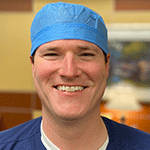 DAVID HICKS, MD
DAVID HICKS, MD
Anesthesiologist, Flaget Memorial Hospital
My experience practicing medicine at Flaget during the pandemic has revealed not only just how challenging this job can be but also the incredible strength and sense of community we enjoy here in Bardstown. These past few weeks, every employee has entered the hospital knowing they were facing grave and unprecedented challenges but felt obliged to serve our community through this. In return, Bardstown and the Nelson County community’s response has reassured us. From small gestures like cards and notes, to larger gestures like Willet’s providing lunch for staff every day for five weeks, the way the community has shown its support reminds us why we’re braving the risks to ourselves and our families. I could not be more proud to be a physician, particularly one who practices here in Bardstown.
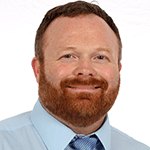 TRAVIS SIZEMORE, MD
TRAVIS SIZEMORE, MD
CHI Saint Joseph Medical Group – Rheumatology, London
I definitely will remember this time as a sudden onset of change. There was change in the way healthcare was arranged, delayed, and delivered. There was a change in perception of ‘wellness’ by patients, willing to postpone their own health to make available the healthcare delivery to those affected by COVID19. This has been an unbelievable lesson in humility in healthcare and need for constant innovation and adaptation.
I would like to forget the delay in production of an efficient treatment for this virus. It is not the mortality rate that we should forget, as the mortality rate is the ultimate reason and impetus for creation of new vaccines and treatment; an ultimate reminder of what we strive to decrease in an infectious disease.
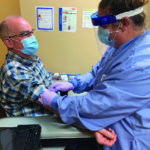 CINDY MATTINGLY, MBA
CINDY MATTINGLY, MBA
Chief Executive Officer Gastroenterology Health Partners, PLLC
The COVID-19 pandemic has had a profound and multifaceted impact on our practice, not all of which has been negative. The pandemic has forced needed change in our industry, which otherwise may have taken years to mobilize. We plan to use some of those residual changes as a springboard for providing an even higher level of service to our patients. CMS lifted restrictions on virtual and telemedicine visits and several days after its announcement, we were able to implement this convenient option for our patients. Doing so provides many benefits; patients, staff and physicians can maintain social distancing guidelines and still engage in many facets of care while lessening stress on the PPE supply chain as an added result. As local and federal social distancing restrictions are removed, GHP plans to continue to offer telemedicine options. We have also prepared for expansion of our office and endoscopy hours, offering extended hours during the week and on weekends to allow immediate access to onsite GI care for our patients.
Know A Good Doctor? We Do.
VISIT US ONLINE!



